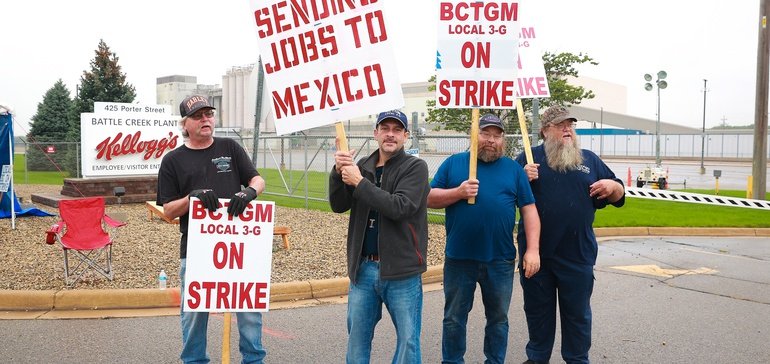Striking Kellogg employees won’t bow to lawsuit pressure, labor rep says

As a strike of more than 1,400 Kellogg workers enters its second week at the company’s ready-to-eat cereal plants, a union representative tells Food Dive they are sticking to their demands despite the threat of a lawsuit and plans to bring in salaried and contract workers to reopen the factories.
Trevor Bidelman, president of the Battle Creek, Michigan, chapter of the Bakery, Confectionery, Tobacco Workers and Grain Millers International Union, is a 17-year employee at the local Kellogg factory. He told Food Dive the strike is “really about the future worker.” The proposed contract offered by Kellogg, according to the union, includes a two-tiered payment plan for new employees that would not give them the ability to eventually receive “full benefits” and retirement pension plans.
“When it boils right down to it, we will not accept a two-tiered benefit system where the path to premium healthcare and pensions are not available,” Bidelman said.
Kellogg did not respond to requests for a response to Bidelman’s comments at press time. In a statement to the Associated Press last week, the cereal maker said its offer was fair and would increase the wages and benefits for employees, who it said made an average of $120,000 a year in 2020.
In a previous statement to Food Dive, spokesperson Kris Bahner said the union’s complaints were without merit as its compensation and benefits are “among the industry’s best.”
Another key complaint by the union focuses on forced overtime work. Workers at the Battle Creek facility regularly worked 12 to 16 hour days, seven days a week since March 2020 in order to meet high cereal demand, according to Bidelman. This is as cereal consumption increased 11% during the pandemic as people had more time for breakfast at home.
Some workers, he added, would routinely volunteer to take the 16-hour shifts so that others would not be forced to by Kellogg plant managers.
“During this entire pandemic, we never stopped production one time,” Bidelman said.
Meanwhile, BCTGM does not appear to be concerned by a lawsuit filed by the cereal giant against the union for “improper actions” that it says intends to cause the company financial harm. Bidelman said it’s “typical” of Kellogg to use its legal team to handle labor disputes instead of its labor negotiators.
The union has also alleged that Kellogg has threatened to move its production lines to Mexico to save costs. Bidelman said the company has been shifting jobs to Mexico since the mid-1990s, when it closed its San Leandro, California, plant. Back then, he said, the company claimed the California plant closure would only affect cereal production for the Southwestern U.S., but over time more jobs from across the country have been sent there.
Last week as the strike kicked into high gear, Kellogg also said it was bringing in salaried staff and “third-party resources” in order to reopen its ready-to-eat cereal plants in Michigan, Nebraska, Pennsylvania and Tennessee. Bidelman said that AFIMAC, the strike security firm Kellogg is using to bring in workers, has a bad track record with the company. During a 2014 employee lockout at the Memphis, Tennessee, Kellogg plant over a different contract dispute, the cereal giant brought in AFIMAC workers and one was prosecuted after filming himself urinating into products on the assembly line. In a statement to local media at the time, Kellogg said it was “outraged by this completely unacceptable situation” and that it would work with authorities to solve the situation.
According to Bidelman, the AFIMAC temporary workers are also not as adept at handling factory equipment, which he said will inevitably lead to more supply chain disruption. Last month, Kellogg announced it was investing $45 million in supply chain restructuring over the next two years, an area that North America President Chris Hood said was causing significant problems for the company during the pandemic.
“I don’t think [Kellogg] is going to help the supply chain at all — in fact, I think they’re going to harm all of us,” Bidelman said. “When we get back in, it’s going to take us probably quite a while to repair the things that they break.”
Source: fooddive.com

